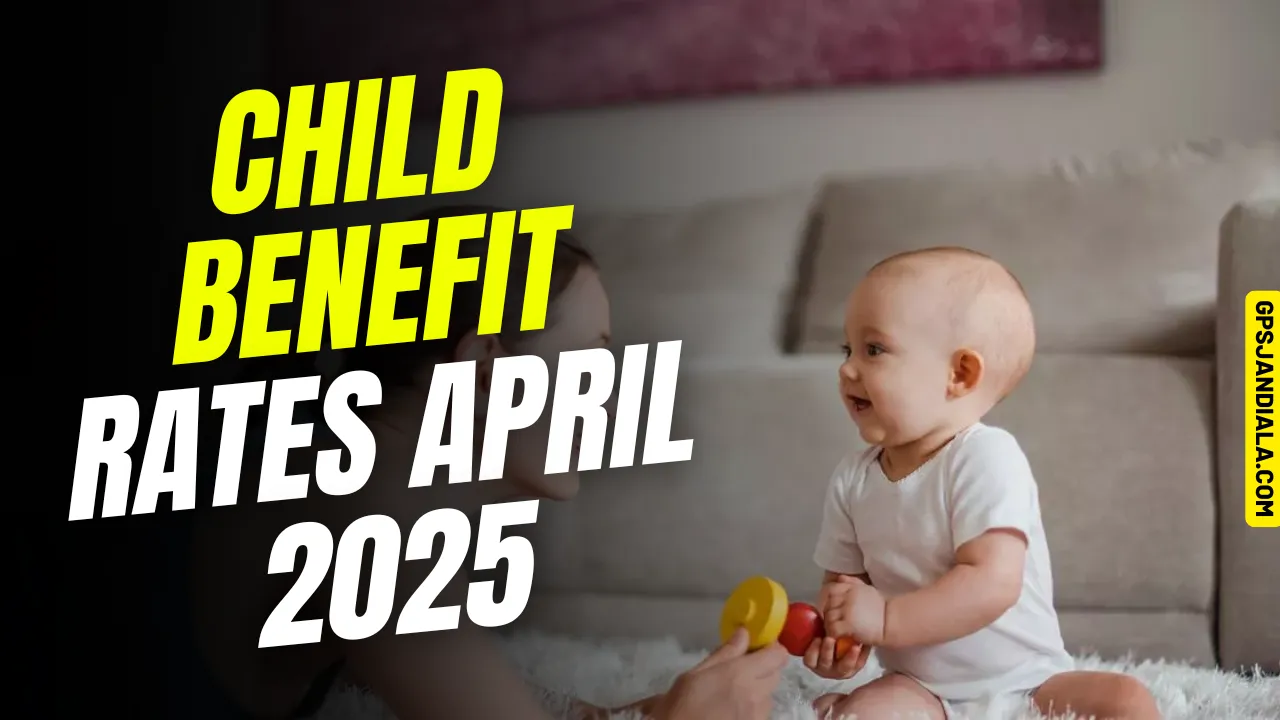Child Benefit Rates April 2025: Families across the UK rely on Child Benefit payments to help with the financial costs of raising children. The government has announced an increase in these payments, which will take effect from April 2025. This change comes as part of the effort to provide better financial support to families, especially at a time when living expenses continue to rise.
Managed by HM Revenue and Customs (HMRC), Child Benefit offers regular payments to parents and guardians responsible for children under a certain age. The new rates will provide slightly higher weekly payments for both the first child and any additional children in a household. While the increase is small, it is intended to help families manage their essential expenses.
Understanding the updated Child Benefit rates, eligibility requirements, and how to apply will ensure that families continue receiving the support they are entitled to. Below is a detailed guide on what to expect from the changes coming in April 2025.
Overview of Child Benefit Rates April 2025
| Category | Details |
| Effective Date | April 2025 |
| Current Rate (First Child) | £25.60 per week |
| Current Rate (Additional Children) | £16.95 per week |
| New Rate (First Child) | £26.05 per week |
| New Rate (Additional Children) | £17.25 per week |
| Eligibility | Parents or guardians responsible for a child under 16, or under 20 if in education |
| Application Process | Through HMRC Child Benefit Portal |
Updated Child Benefit Payment Rates
The new Child Benefit rates will apply from April 2025, reflecting a small 1.7% increase in payments compared to the current rates.
Under the new system, parents will receive:
- £26.05 per week for the first child
- £17.25 per week for each additional child
For many families, this increase will provide extra support to help cover childcare costs, food, and education expenses. Over a year, this adjustment will contribute to a modest but helpful rise in financial assistance for parents.
Who Can Claim Child Benefit?
To qualify for Child Benefit, parents or guardians must meet specific requirements.
Applicants must be responsible for a child who is:
- Under 16 years old
- Under 20 years old and enrolled in an approved education or training program
The person applying must either live with the child or be the primary caregiver. Only one person can claim Child Benefit for each child, even if two parents share childcare responsibilities.
Education and Training Requirements for Child Benefit
For children over 16, Child Benefit payments continue only if they are enrolled in an approved education or training program. These include:
- A-Levels, T-Levels, or Scottish Highers
- NVQs or vocational qualifications up to Level 3
- Traineeships in England
- Home education that started before the child turned 16 and is continuing due to special needs
Employer-funded courses are not eligible for Child Benefit payments. Parents should ensure that their child remains in a qualifying program to avoid payment disruptions.
High Income Child Benefit Charge (HICBC): How It Affects Payments
Families where at least one parent earns over £60,000 per year may have to repay some or all of their Child Benefit through the High Income Child Benefit Charge (HICBC).
The repayment system works as follows:
- If an individual earns more than £60,000, they will need to repay a portion of their Child Benefit through their annual tax return.
- If income exceeds £80,000, the full amount of Child Benefit must be repaid.
- The repayment amount increases by 1% for every £200 earned above £60,000.
For example, a household where one parent earns £65,000 would have to repay part of the benefit, while a household where one parent earns £80,000 or more would have to repay it in full.
Parents who expect their income to rise above the threshold may choose to opt out of receiving Child Benefit to avoid repayment through their tax return. However, opting out entirely could impact National Insurance credits, which contribute to state pension eligibility.
Important Deadlines and Notifications from HMRC
To continue receiving Child Benefit, parents must ensure that their information remains updated with HMRC.
Parents with children who are turning 16 will receive a confirmation letter from HMRC asking whether the child is continuing education or training. Failure to respond may result in payments being suspended.
Keeping contact details and income records updated is crucial to avoiding disruptions. Any changes in household income, education status, or residency should be reported to HMRC promptly.
How to Apply for or Update Child Benefit Claims
For those who are newly eligible for Child Benefit or need to update their claim, the process is straightforward.
Steps to Apply for Child Benefit
- Visit the HMRC website and access the Child Benefit application portal.
- Complete the online application form with details about the child and the parent or guardian applying.
- Provide necessary documents, such as birth certificates and proof of residency.
- Submit the application and wait for HMRC to confirm approval.
Applying as soon as possible after a child is born or becomes eligible will help prevent delays in receiving payments.
Frequently Asked Questions (FAQs)
Who qualifies for the Child Benefit increase in April 2025?
Any parent or guardian responsible for a child under 16, or under 20 if in full-time education or training, is eligible for Child Benefit. The applicant must reside in the UK and provide financial support for the child.
Can both parents claim Child Benefit for the same child?
No, only one parent or guardian can claim Child Benefit for each child, even if both parents share caregiving responsibilities.
What should I do if my income exceeds £60,000?
If you earn over £60,000, you may have to repay part of your Child Benefit through the High Income Child Benefit Charge (HICBC). Those earning over £80,000 will have to repay the full amount. You can choose to opt out of receiving the benefit, but this may affect your National Insurance contributions.
Are employer-funded training programs eligible for Child Benefit?
No, employer-funded training programs do not qualify. Children over 16 must be enrolled in an approved education or training course for Child Benefit to continue.
How can I prevent disruptions in my Child Benefit payments?
Ensure that all contact details and income information are updated with HMRC. If your child is turning 16 and still in education, respond to HMRC’s confirmation letter to avoid payment suspension.
Final Thoughts
The increase in Child Benefit rates in April 2025 will provide additional financial support to families across the UK. While the rise is relatively small, it helps parents manage the ongoing costs of raising children.
Families should ensure they meet all eligibility requirements and keep their information updated with HMRC to avoid any payment disruptions. Those earning above the High Income Child Benefit Charge threshold should also plan accordingly to avoid unexpected tax repayments.
By staying informed and proactive, parents can make the most of this essential financial support and ensure a smooth application or renewal process. For more information, visit the HMRC Child Benefit website.












